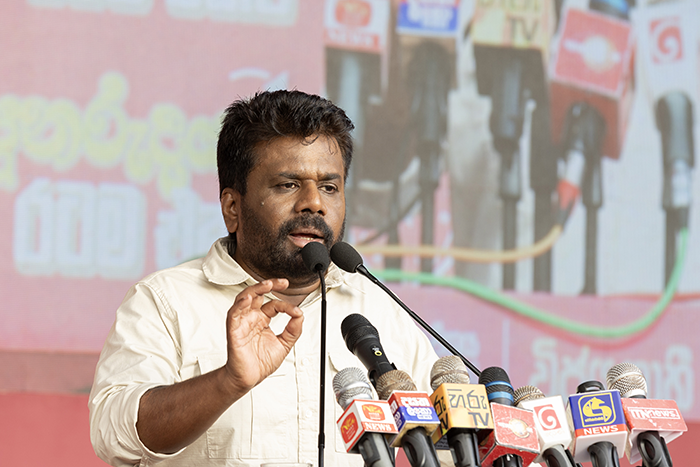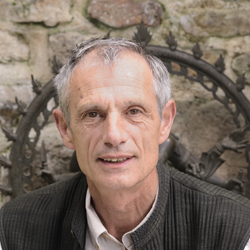Interviews / Asia-Pacific
1 October 2024
Presidential Election in Sri Lanka: What Future for the Country?

Long marked by civil war, Sri Lanka has had to contend with significant political instability, compounded by a severe economic crisis since the Covid-19 pandemic. This crisis reached its peak during the protests of July 2022, which led to the fleeing of President Gotabaya Rajapaksa after his palace was stormed by protesters. However, he was replaced by his unpopular Prime Minister, who did not alter the course set by his predecessor, yielding to the austerity plans of the International Monetary Fund (IMF) in exchange for financial aid. This ongoing crisis culminated on September 21 with the election of the left-wing opposition candidate, Anura Kumara Dissanayaka, who promises a break from the existing system. Is this commitment credible? Is the new government capable of alleviating the economic crisis plaguing the country and renegotiating the IMF’s demands? What could be the implications of this election on the country’s foreign policy and its involvement in the Indo-Pacific region? The insights of Jean-Joseph Boillot, Associate Researcher at IRIS.
The election of Anura Kumara Dissanayaka (AKD), the candidate from the “far left,” to the presidency of Sri Lanka on September 21 marks a turning point in the country’s political life. In what social, economic, and political context was the election held?
The political past of the new president, Anura Kumara Dissanayaka, from the far left, is a factor whose significance should not be overstated. This is more of a “left-wing front” configuration, somewhat similar to the New Popular Front in France, although the history and profile of the man commonly known as “AKD” in Sri Lanka are quite comparable to Jean-Luc Mélenchon. Anura Kumara Dissanayaka, relatively young (55 years old), won the presidential election with 42% of the vote, ahead of opposition leader in Parliament, Sajith Premadasa, by ten points. However, while AKD’s victory is that of his very left-wing, neo-Marxist nationalist party, the JVP (People’s Liberation Front), it is also and primarily the victory of the NPP (National People’s Power), an alliance of 21 social movements and trade unions, for which he was the unifying candidate. The JVP holds only three of the 225 seats in the current Parliament, elected in 2020, which led to one of his first decisions to dissolve the chamber and call for new parliamentary elections instead of the normal 2025 term.
On the substance, the NPP won largely by adopting the demands made by civil society during the 2022 popular revolution (the “Aragalaya”), which had ousted President Mahinda Rajapaksa, accused of nepotism and corruption. He fled and is now living in hiding in one of the Gulf countries, where he amassed a small fortune. The NPP presents itself as an “incorruptible” organization, with a transparent political culture. It promises a new constitution to be put to a referendum, which will abolish the presidential system and restore the powers of parliament. Thus, this is a president elected on a wave of a “system change” paradigm. The Sri Lankan people hope he will succeed, thanks to his reputation for incorruptibility and through profound transformations in terms of digitalizing administration, transparency, greater accountability of elected officials, with independent oversight mechanisms and the strict and fair application of the rule of law in a still very clan-based country.
What changes in foreign policy could be expected following the election of Anura Kumara Dissanayaka, particularly regarding India, China, and the United States? What is the position of Sri Lanka in the Indo-Pacific?
Geopolitically, Anura Kumara Dissanayaka is more favorable towards China, particularly from an ideological perspective, and his predecessors had already forged strong ties with Beijing to break free from what they perceived as India’s paternalistic and burdensome influence. Economically, where China is by far the largest bilateral creditor, Beijing’s initial statements have been swift and fairly clear: “China hopes that Sri Lanka will maintain its stability and development, and is ready to play a constructive role in the harmonious economic and social development.” The same spokesperson from the Chinese Ministry of Foreign Affairs declined to comment on AKD’s request to renegotiate the debt agreements with Beijing made in late 2023, which is a condition for an agreement with the IMF, but he stated that “China hopes to deepen high-quality development in the construction of the Belt and Road Initiative.” Sri Lanka holds a prominent position on these “New Silk Roads” passing through the Indian Ocean to the Persian Gulf. Therefore, it is likely that the strong relationship with Beijing will be maintained for both economic reasons and geostrategic considerations due to rivalry with India, which is not particularly pleased with the left’s victory in Sri Lanka.
However, the harsh geographical realities will prevail, and AKD will likely engage in a delicate balancing act with India. He is also fully aware of the power of the United States and the necessity of dealing with the IMF, with which negotiations have proven highly political. The new president will therefore be cautious and maintain a balanced diplomacy, keeping good relations with all, though it remains uncertain whether he will shift towards what is now called “multi-alignment” or even a double game, or return to Sri Lanka’s traditional position within the Non-Aligned Movement, which it joined at its creation during the Bandung Conference in 1955. AKD’s position on the BRICS and the two current conflicts in Ukraine and the Middle East is particularly anticipated, even though his personal leanings are already known to be generally in favor of Russia and the Palestinians.
Given the island’s geostrategic position south of the Indian subcontinent and its location on all the routes now called the “Indo-Pacific,” there is little doubt that the coming months will see a tight political struggle between the new regime’s domestic legitimacy and its geopolitical positioning, which some hope will remain neutral if not pro-New Delhi.
What measures are being considered by the new president to address the economic crisis the country has been facing since 2022, as well as the austerity demands from the IMF?
AKD acted swiftly on this matter. He immediately declared his intention to renegotiate the IMF program that had been finalized in late 2023 by a very weak government, as the unelected President Ranil Wickremesinghe, former Prime Minister under the dictator Rajapaksa, had received less than 1% of the vote and had fallen out with his own party, the UNP (United National Party). Faced with Sri Lanka’s $46 billion debt, the IMF had unlocked emergency aid of $2.9 billion, in exchange for measures deemed very unpopular: tax hikes, price increases, and cuts in public spending, among others.
During his campaign, AKD and his coalition committed to reducing taxes on essential goods, particularly food and energy, whose prices had skyrocketed over the past two years. While the IMF has expressed willingness to discuss this with him, it is likely that the negotiations will still be difficult. Anura Kumara Dissanayaka cannot afford to disappoint his popular electorate. This group is under significant strain, as illustrated by a well-known Sri Lankan journalist: “1. The millions of Sri Lankans who skip at least one meal a day to follow austerity measures. You know, those literally tightening their belts; 2. The 500,000 households plunged into darkness because electricity was cut off. No electricity bills, sure, but also no power; 3. The hundreds of thousands of people who have had to park their cars permanently because of fuel prices. Thanks to their sacrifice, we can now afford the luxury of having fuel without waiting in line, because no one can afford to buy it; 4. The countless Sri Lankans forced to find work abroad, sending dollars back home for us to survive. Global labor or national saviors?”
However, given the economic urgency and the inertia of the parliamentary process, AKD will not radically alter the trajectory set by the IMF and will adhere to the sustainable debt analysis (SDA) agreement already agreed with the IMF, making only internal adjustments within the SDA framework. Any changes outside the limits of the agreement would result in protracted negotiations. He has also kept the Governor of the Central Bank and the Finance Minister, who were involved in the negotiations with the IMF, in their positions.

